This article is about Hyperbaric oxygen therapy as a new treatment approach for Alzheimer’s disease. Alzheimer’s disease is a progressive neurodegenerative condition that affects millions of individuals worldwide, leading to memory loss, cognitive decline, and a reduced quality of life. Researchers and medical professionals are constantly seeking innovative approaches to improve the treatment and management of this challenging condition. One such emerging treatment approach is hyperbaric oxygen therapy (HBOT). This article explores the potential role of HBOT as a novel treatment for Alzheimer’s disease, shedding light on its mechanism and efficacy.
Hyperbaric oxygen therapy as a new treatment approach for Alzheimer’s disease (AD): Alongside the increase in life expectancy, the prevalence of age-related disorders, such as neurodegenerative diseases, is on the rise. For example, AD, the most common form of dementia in the elderly, accounts for 60–80% of all dementia cases. However, there is presently no cure for this disease and no effective treatment that would slow disease progression despite billions of dollars invested in drug development. As AD is a complex disease, the development of effective and specific drugs is difficult. Thus, examining alternative treatments that target several disease-related pathways in parallel is of the utmost importance. Hyperbaric oxygen treatment (HBOT) is the medical administration of high concentration oxygen at environmental pressure greater than 1 atmosphere absolute (ATA).
HBOT has been shown to improve neurological functions and life quality following neurological incidents such as stroke and traumatic brain injury, and to improve performance of healthy subjects in multitasking. The current perspective describes a recent study demonstrating that HBOT can ameliorate AD-related pathologies in an AD mouse model, and provides unique insights into HBOT’s mechanisms of action. Old triple-transgenic model (3xTg)-AD mice were exposed to 14 days of HBOT and showed reduced hypoxia and neuroinflammation, reduction in beta-amyloid (Aβ) plaques and phosphorylated tau, and improvement in behavioral tasks. This and additional studies have shown that cerebral ischemia is a common denominator in many of the pathological pathways and suggests that oxygen is an important tool in the arsenal for our fight against AD. Given that HBOT is used in the clinic to treat various neurological conditions, the authors suggest that this approach presents a new platform for the treatment of AD.
FAQs for Hyperbaric oxygen therapy as a new treatment approach for Alzheimer’s disease
Q1: What is Alzheimer’s disease, and why is it a significant concern in healthcare?
A1: Alzheimer’s disease is a neurodegenerative disorder characterized by memory loss, cognitive decline, and changes in behavior. It is a significant concern due to its increasing prevalence and the substantial impact it has on individuals and their families.
Q2: What is hyperbaric oxygen therapy (HBOT), and how does it work as a potential treatment for Alzheimer’s disease?
A2: HBOT is a medical treatment in which individuals breathe high concentration oxygen in a pressurized chamber. The increased oxygen levels may promote brain health and slow the progression of Alzheimer’s disease.
Q3: What is the rationale behind using HBOT for Alzheimer’s disease, and how might it benefit patients?
A3: HBOT aims to enhance brain function and improve cognitive abilities in Alzheimer’s patients by increasing oxygen delivery to brain tissues. This may help reduce neuronal damage and enhance overall brain health.
Q4: Are there any ongoing clinical studies or research supporting the use of HBOT for Alzheimer’s disease?
A4: Ongoing research and clinical studies are exploring the efficacy of HBOT in Alzheimer’s disease. These studies aim to provide scientific evidence supporting the use of HBOT as a treatment approach.
Conclusion
In conclusion, Hyperbaric Oxygen Therapy (HBOT) emerges as a promising and innovative treatment approach for Alzheimer’s disease (AD). While the research is still in its early stages, several studies suggest that HBOT can potentially mitigate cognitive decline in AD patients. By improving cerebral oxygenation, reducing inflammation, and promoting neurogenesis, HBOT offers multifaceted benefits. However, further extensive clinical trials are essential to validate its long-term effectiveness, safety, and optimal protocols. As the search for effective AD treatments continues, HBOT remains a compelling avenue with the potential to enhance the quality of life for those affected by this devastating disease.






